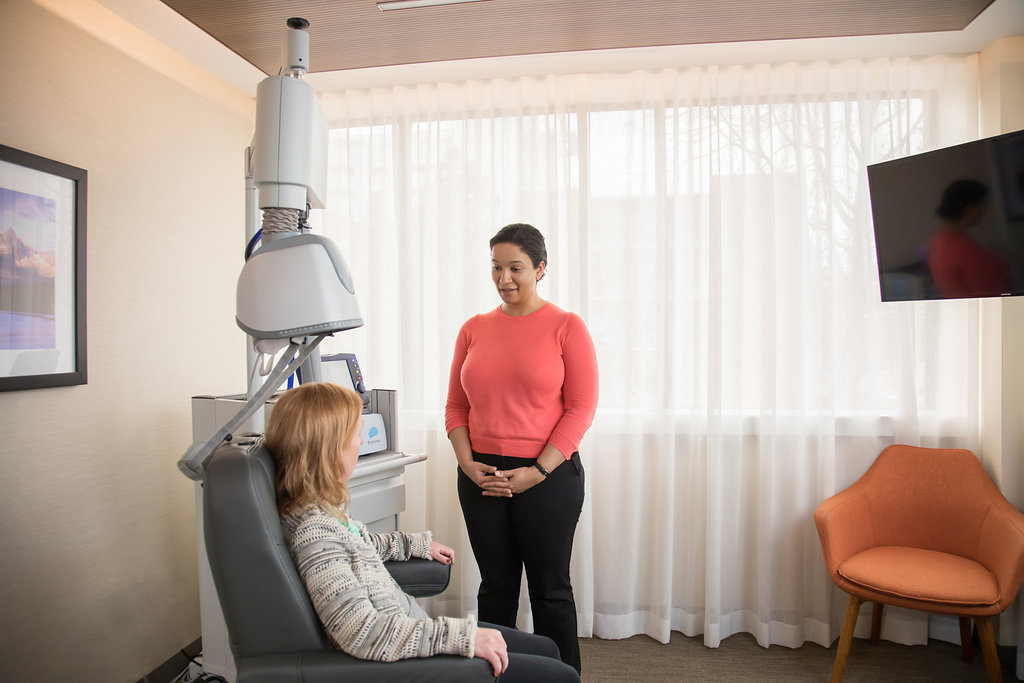Transcranial magnetic stimulation, also known as TMS therapy, is a revolutionary treatment for clinical depression, among other conditions. This noninvasive procedure involves using magnetic fields to stimulate the specific part of the brain known to be inactive or underactive in patients with clinical depression.
Although experts aren’t sure exactly what causes clinical depression, the current leading theory is that symptoms arise as a result of an imbalance between the brain’s neurotransmitters. Neurotransmitters are responsible for carrying chemical messages between neurons. Neurotransmitters also affect the functioning of other types of cells and manage just about every process that takes place throughout the body.
Because there are so many types of neurotransmitters that affect so many different bodily functions, transcranial magnetic stimulation has the potential to act as an effective treatment for a wide range of conditions apart from clinical depression, from Parkinson’s disease and migraines to other psychological conditions like obsessive-compulsive disorder, bipolar disorder, post-traumatic stress disorder, anxiety conditions, and addiction. However, more studies are required to determine the full potential of this innovative therapy.
Serotonin is the primary neurotransmitter whose dysfunction is thought to result in clinical depression. That’s why many antidepressant medications, such as SSRIs (selective serotonin reuptake inhibitors) target that specific chemical and work to increase its presence in the brain by blocking and slowing its reabsorption.
When there is a lack of serotonin available for the brain to utilize, the resultant symptomsmay include feelings of anxiety, worthlessness, sadness, emptiness, guilt, irritability, hopelessness, or even a complete lack of emotion altogether. Patients may also experience problems with remembering things, making decisions, concentrating, and falling asleep. Physical symptoms include an inability to sit still, appetite changes, headaches, weight changes, digestive issues, and fatigue. To be diagnosed with clinical depression, a patient must experience at least five symptoms for two weeks or longer.
TMS therapy, which is different from ECT (electroconvulsive therapy) and carries less risk of serious side effects, targets an entire physical area of the brain rather than a specific chemical messenger. When used to treat clinical depression, the treatment targets the bilateral prefontal cortex, the area of the brain known to control a person’s mood. Providers most often use it to treat patients experiencing treatment-resistant depression, which is a type and severity of clinical depression that responds poorly, if at all, to more common treatments like antidepressants.
First, a metal coil is applied to the patient’s forehead. This coil acts as the vehicle for the magnetic current to reach the brain. The magnetic field generates an electric current in the brain which, depending on the location and strength of treatment, can trigger various neural responses. Apart from the significantly decreased risk of side effects, TMS therapy offers many other benefits when compared to ECT. For example, TMS therapy does not require anesthesia or hospitalization and is not a surgical procedure. Patients can drive themselves to and from the clinic and are unlikely to experience any discomfort, although a mild headache or short-lived tingling feeling may occur. Transcranial magnetic stimulation is often used in conjunction with other treatment options such as psychotherapy and traditional medication.
Mindful Health Solutions is the leading provider of transcranial magnetic stimulation in California and operates out of ten locations in the area. The provider accepts coverage from most common health insurance providers. For patients who lack access to insurance coverage, the company helps patients obtain financial assistance. The team also provides a variety of financing options to make sure that anyone in need can afford to receive this potentially lifesaving treatment. These efforts are all part of Mindful Health Solutions’ commitment to treating patients as valuable individuals who deserve access to proper mental healthcare, regardless of their financial situations.
To schedule a consultation, call 844-867-8444. You can also complete the online form, and someone will contact you within one business day.

